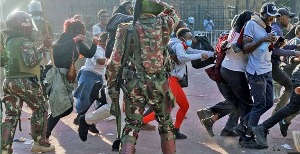I have been thinking of why some banks, savings and loans companies and finance houses were shut down in “Rambo style” and the only conclusion I come to each time this crops up is that it was a premeditated well executed “corporate murder” based on a prophecy that was self-fulfilled by those who wanted those organisations to die.
I was more convinced when the Corporate Insolvency & Restructuring Act, 2020 (Act 1015), came into force and the fact that there was about GHS20 billion for the exercise, “waow”.
Act 1015 for the first time in the corporate governance in Ghana introduced the concept of “Administration” which focuses more on salvaging a distressed company than “suffocating” it to death.
It seems those who knew about this law being passed were in a hurry to “kill” before the “vaccine” was developed. Of course some of the financial institutions were on life support and may not have been salvaged but some too clearly were just sick, in distress but the doctor, Bank of Ghana, decided to use an old vaccine “textbook, easy way out method” to kill them. Not considering the fact that these corporate legal persons had responsibilities towards employees and extended families not directly connected with these institutions.
Forget the shareholders who seem to have been the target of “show of power” which to me was also misplaced unless they were shareholder directors. Even that, why should the banks who are first companies suffer for the wrongs of those who were supposed to manage their affairs?
Hitherto, where a company was unable to pay its debts as and when they fall due creditors or shareholders may petition the court for the official winding up of the company. This is when for example a written demand has been made on the company requiring payment and after 21 days has neglected to pay the sum owed or not made satisfactory arrangement to do so; also an execution or other process issued on a judgment, decree or order of any court in favor of a creditor of a company is returned unsatisfied, that is a judgment debt is unsatisfied whole or in part; a proof that looking at both contingent or prospective liabilities of the company to the satisfaction of the Registrar the company will be unable to pay its debt.
The aim was to maximize the realization of the estate of the insolvent. This arrangement was more creditor’s centric making sure they got most of their money back without finding ways to bring the company back to business to save all stakeholders. This is now an “old school ” text book 101 solution.
As in the case of Morkor v Kuma, a company is a separate legal entity with right to perpetual existence hence letting the company suffer from the alleged misdeeds or mismanagement by the board of directors who per the case of Salomon v Salomon are vested with the power to manage the company would be unfair on the company as a legal person.
The Corporate Insolvency & Restructuring Act, 2020 (Act 1015), introduces the concept of administration and restructuring if the company cannot pay its debts as and when they are due even if the company has a negative net worth. This is an attempt to salvage the company as an innocent person to be able to continue business, make profit and pay off its debts.
The purpose of Act 1015, is to give any distressed company the opportunity to as much as possible continue as a going concern, with temporary management of the affairs, business and property of the company to ascertain the possibility of reviving it. It also allows the development and implementation of a restructuring plan which results in a better return for the creditors, shareholders, and employees of the company, the new vaccine, than what would have resulted from the immediate winding-up of the distressed company, the old vaccine.
This is really not about technical justification that the affected institutions had weak financials such “weak balance sheet” but that, the process used was too basic a solution you will get from an exam paper when the scenario is presented. Anybody could have done that, you don’t need a doctorate in economics.
Banking thrives on something quite intangible called “trust and confidence” and once you are able to destroy these no bank can survive. The “corporate murderers” used that as their “modus operandi” so set it in motion. First you decide to raise the capital requirement of these financial institutions then you ask that all fund managers who have fixed income investment with these financial institutions to withdraw them because it was against the law.
Very simple regulatory solution. You decide not to pay the contractors government owes so they pay the banks, they the contractors also owe. Bank of Ghana amidst this raises the capital requirements from GHS100m to GHS400m. This will shake the foundation of any financial institution which will then start showing negative signs on the financials. A premise is made that most banks are weak when the conditions for them not to survive has been set in motion.
Now watch this, then the rumor is started in the system that some banks were going to be closed down creating uneasiness in the system. After, certain names are leaked like The Royal Bank and UT Bank. Still rumors but customers start acting by withdrawing their money from these banks. Those who owed these banks too decided to stop paying hoping that there could be something in it for them. The bucket is leaking and water not flowing from the tap, what is likely to happen to bucket? Now you go pick up the empty bucket and say the bucket is empty. I am taking it way.
Now the general public realises the rumor on the two banks became real. What do you think will happen when the next set of rumors come up? Panic hits the system and customers start withdrawing their money creating a systemic risk. Since these customers still somehow needed to keep their money somehow, somewhere, they moved to savings and loans company. Then announcement goes from Bank of Ghana that after the banks they will be going to the savings and loans companies. What do you expect to happen?
Customers start making demands for their money from most of the savings and loans companies because names had not been leaked yet. Majority of these savings and loans companies became stressed. Those with ordinary “cough and headache” started getting “hypertension and diabetes”. Then specific names are leaked. Those whose name were not leaked started healing gradually since precedence has shown that it is only the leaked names that go down. Then Bank of Ghana goes in that these financial institutions are dying or clinically dead so pulls the plug.
My observation was that most of these customers making the withdrawals did not really need the money but were testing the system if it was true these institutions were weak. Reason being that initially those who got their money deposited them back but when the demands took a systemic risk no one could cope.
Lo and behold, with the “run” on the financial institutions they could not meet the demands. If the banks had some money to be paying the initial demands the “trust and confidence” would have been re-built and the system would have re-corrected itself. The amount of GHS20billion would not have been needed.
In very simple terms, this is how the financial system and the money circulation works. If you have three banks A,B and C owing each other. A owes B, GHS10 and B owes C , GHS10 with C owing A, GHS10.
All you need is GH10 to solve this problem. You give A, GHS 10 to pay B who then pays C and C intend pays A all with the same GHS10 and the cycle begins. If you however break the cycle by refusing to support with the GHS10 to bank A and they all start making demands on each other and want their money then you need GHS30 to pay off all of them. Are you happy with GHS30 bailout or the GH10 that could save everybody and families?
If GHS20 billion was available, then the motive was not to save. The “corporate murderers” had already planned to create what we have as the “consolidated bank” and the agenda was set in motion. Start on the premise that the Ghanaian owned banks or financial institutions are weak.
Use policy to have evidence on paper by raising the capital requirements and takeaway institutional wholesale deposits by the fund managers, do not pay contractors. Now move to the retail deposits by creating fear and panic, destroying “trust and confidence” to have a ripple effect so the system destroys itself. You then sit back as say “ Didn’t we say the banks were weak”? when you facilitated the process of making them weak to the point of death yourself. Only Ghanaian owned institutions were targeted because it would not create international news. Indeed, this was a pre-meditated “corporate murder” with a prophecy that has been self-fulfilled.
Once you “consolidate”, to let everybody think you made the right decision you start paying selective contractors who are now customers of “The Consolidated Bank” and pass the bailout money through the same bank. What do you think will happen to the financials of this new bank? They will be profitable.
If my thinking is right, then the plan is not over. The assets of the deceased “corporate persons” will have to be of benefit to those who murdered them. Should even the Consolidated Bank become distressed along the line which is not likely, Act 1015 may save it. How convenient and wise.
Employees and customers are all pawns in this grand scheme. The Consolidated Bank will have to be made attractive and will have to be sold off to complete the process. Watch the space.
The Writer: Anthony King, ex bank staff and victim
Opinions of Saturday, 25 July 2020
Columnist: Anthony King















